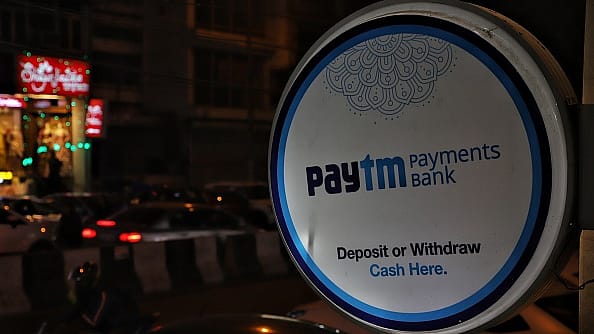RBI received 3,513 complaints against Paytm bank in FY23; highest among payment banks
ADVERTISEMENT

Paytm Payments Bank (PPBL), which is facing the risk of losing its licence after March 15, had the highest complaints amongst payments banks in the financial year 2022-23, according to the latest data released by the Reserve Bank of India (RBI).
The central bank received 3,513 complaints against PPBL in FY23, constituting 62.5% of the total complaints of 5,623 against all payment banks. The complaints per branch against Paytm bank was 501.86 between April 1, 2022, and March 31, 2023, as per the RBI annual report published on March 11.
The report shows that after PPBL, Airtel Payments Bank received the second-highest number of complaints at 1,370; followed by India Post Payments Bank and Fino Payments Bank, which reported 364 and 226 complaints, respectively.
In terms of complaints per branch, NSDL Payments Bank was the second on the list with 107 cases per branch, followed by Airtel Payments Bank with 41.52 complaints per branch.
Among small finance banks, the central bank received maximum complaints of 899 against AU Small Finance Bank, followed by Equitas Small Finance Bank (375) and Jana Small Finance Bank (310).
Meanwhile, State Bank of India (SBI) recorded the largest number of complaints of 40,345, which was the highest among the public sector banks. SBI was followed by Punjab National Bank and Bank of Baroda with 12,850 and 9,944 complaints, respectively.
In the private banking space, maximum complaints of 16,602 were registered against ICICI Bank, followed by HDFC Bank (14,979) and Axis Bank (13,713).
On January 31, 2024, the RBI imposed severe business restrictions on Paytm bank, asking the payment aggregator to stop onboarding new customers with immediate effect. The central bank barred PPBL from taking further deposits or credit transactions or top-ups in any customer accounts, prepaid instruments, wallets, FASTags, NCMC cards, etc. after February 29. Later, the RBI extended the deadline by 15 days to March 15, keeping in view the interest of customers (including merchants), who may require a "little more time" to make alternative arrangements.
Post the RBI action, the parent company, One97 Communications, announced discontinuation of various inter-company agreements with Paytm bank, while Vijay Shekhar Sharma resigned from his position as part-time non-executive chairman and board member of PPBL. Besides, it also formed a group advisory committee chaired by former SEBI chairman M Damodaran to work with the board in further strengthening compliance.
Paytm Payments Bank, 51% owned by Sharma while the remaining 49% by One 97, has also decided to simplify the shareholders' agreement (SHA) to support its governance, independent of its shareholders.
After the RBI action, Paytm parent One 97 Communications has witnessed sharp correction in its share price as most brokerages downgraded the stock and cut target prices, citing that the central bank’s notification action may bring an end to the operations of Paytm bank. The share of Paytm has plummeted more than 50% from ₹761 at the close on January 31, 2023, while its market capitalisation has dropped to ₹23,500 crore, from ₹48,336 as on January 31, 2024.
As per the company, the RBI’s action is likely to have a worst-case impact of ₹300-₹500 crore on its annual EBITDA going forward. However, it expects to continue on its trajectory to improve its profitability.
Recently, Australian brokerage major Macquarie further downgraded the Paytm stock, cutting its 12-month price target from ₹650 to ₹275, while rating it ‘Underperform’ from ‘Neutral’. The brokerage firm, in its latest note, thinks the regulatory crackdown could cause a huge reduction in revenue for the Vijay Shekhar Sharma-led fintech major. Also, it thinks Paytm could see an "exodus" of its customers amid the uncertain future of its associate banking entity.